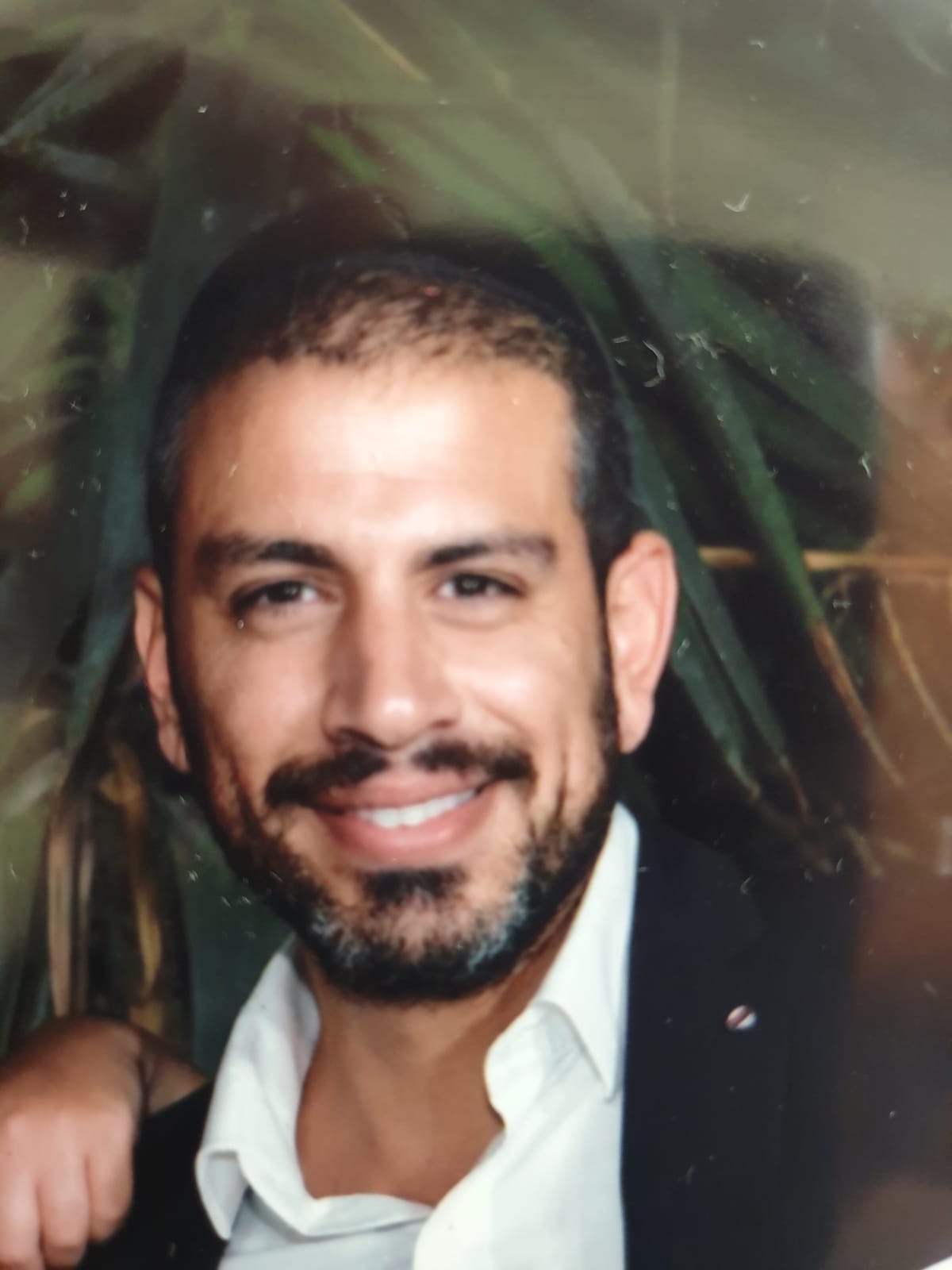From the Stage to the Study Hall: Actor Moshe Weitzman's Emotional Transformation
Moshe Weitzman, after years of acting and rising as a star, decides to change direction. Now, he practices blacksmithing, studies with a partner, immerses daily in the Kinneret, and believes: "The main thing is to bring pleasure to the Creator."
 Moshe Weitzman (Photos: Private Album)
Moshe Weitzman (Photos: Private Album)"The glamour, the fame, and the glory - that's not me, it doesn't connect with my soul," says the former actor Moshe Weitzman (32) this week, who played in very famous series alongside well-known actors, and has since undergone a process of return to faith. Recently, Weitzman received an offer to participate in a new reality show, which he immediately declined: "I would not return to acting and the stages, only to sanctify God's name. I'm in a different place, where studying the Talmud truly excites me."
Rising Star
A small and cozy study hall operates beneath Weitzman’s home, a place that allows him and his study partner to sit and deeply study the Talmud. Just about six months ago, his first daughter was born, and the new father is overjoyed with happiness, "These are the real lives, I study Torah and try to live by it - that’s true happiness for me."
Many Israelis recognize Weitzman from the series they used to watch about 18 years ago, when he starred alongside actress Gilat Ankori. The television exposure that once seemed promising turned Weitzman into a local star, and fans often sought his autograph. From Weitzman's perspective, he thought he was on the path to success, until the quick realization came.
He currently resides in Tiberias, the Galilee city where he was raised and left in his early 20s to pursue the Hollywood dream - to become a successful actor. His first destination was Tel Aviv. Around the time he was enlisted in the Border Police, he began studying acting in the afternoons, so the studies would fit with military service. "I studied for three years in acting schools, during which I was sent to audition for one of the most famous series at that time. Luckily, I was accepted and participated in eight episodes. They would come to pick me up at five in the morning to the studio in Neve Ilan, Jerusalem, with all the gang for the shoots. That's how I met very famous actors like Maor Cohen."
Day by day, Weitzman started mingling in the scene. "We would go out together and I was connected to all the gang on set. It was very nice to meet everyone and laugh with them. As a young man from Tiberias, I felt that I was achieving something that many try to achieve, and here I was – in my eyes, that was success, an elevated feeling that I didn't want to end. The filming lasted two weeks and I was happy. Eight months later, when I was already enlisted, the show aired, and I admit that I was glued to the screen to see myself. I managed to reach a goal that many students in my batch failed to achieve."
In Tiberias, he was marked as a rising local star: "It was at the level of people asking for autographs. This might have been fleeting glory, but that glory is a kind of dangerous drug because if you don't have it, you might fall into depression. In hindsight, it's good that I had the ability to enjoy that moment but not beyond. By nature, I am a modest and shy person. It's hard for me to get on stage and start talking. Maybe that's the reason I loved acting - it gave me confidence."
The Art of Blacksmithing
After being discharged from the army, Weitzman stayed in Tel Aviv for another two years, continuing to try to succeed and gain recognition, but soon decided to recalculate his path. That's how he found himself back in Tiberias. "Indeed, I performed in a musical, but it wasn’t enough. I began to understand that I needed to earn a living and survive, and it's very hard to do so in this field. Plus, it was precisely my touch with the acting world that sharpened my insights. I looked at those bigger than me in the field, at those who have come a long way, and realized - they are only flesh and blood. When I did some soul-searching, I concluded that it truly does not fill a real internal place for me, the emptiness remains. Today, when I hear a new Talmudic insight, it's the thing that blows my heart away and makes me excited."

In those days, Weitzman began studying blacksmithing with the greatest teachers in the country – Uri Hofi, a blacksmith from Kibbutz Ein Shemer and a world-renowned teacher, and Hiram Akir from the village of Makr, one of the well-known blacksmiths in the world. Over time, he began practicing blacksmithing: "I knew the field from my father, a welder by profession, who employed blacksmiths since I was a child. As a child, I used to come to the workshop, sit at the table, and watch the blacksmiths' craftsmanship. I would make works, but my father wouldn’t believe that I actually made them, and he would give me a piece of iron and encourage me to create more until I became a blacksmithing teacher. Today, I have the ability to make special works out of iron, almost anything is possible. When I started working as a blacksmith, I didn't really know that it was a craft existing since ancient times. Only after I delved into it and began learning about the profession did I understand that it is mentioned in the Torah, for example, in the Parashat 'Ki Tetze', it says: 'and you shall make a parapet for your roof and you shall not bring blood upon your house'. I engaged in holy work, and for a believer, that brings great satisfaction. Especially when you know that the house owner who ordered the parapet tends to bless for the mitzvah (to install a parapet) since it is a mitzvah from the Torah. Also, our ancestors made swords, bowls, cutlery, and other utensils for sustenance, and we in the 21st century still engage in it."
Currently, Weitzman practices blacksmithing as a hobby, "It's still in my heart, I will return to it at some stage of my life but right now is not the time. Currently, I am an independent marketer of an Israeli product I developed - a cosmetic vacuum that sucks in dust particles and vapors of materials dispersed in the air during nail filing and hair straightening. I always dreamed of developing something and passing it on. I believe we were created to receive and give. I never dreamed of reinventing the wheel, but I did think about how to help make it turn better. My mind is always working and thinking about how to develop new products or methods and to move our wheel more efficiently. In this sense, I am fulfilling my childhood dream - working in a job where I give of myself, from the artist within me - to my clients. The vacuum is currently sold in the country, and starting next year, we will begin selling it in the USA."
I Regret Nothing
Weitzman adopted an ultra-Orthodox lifestyle. He usually prays at sunrise, immerses in the waters of the Kinneret, and sets fixed times for Torah study with a partner. "I went through a process, and Hashem is an inseparable part of my success. The main faith is knowing that when you get up in the morning, everything that happens to you is from the heavens – for good and for bad."
Weitzman has been in this process for several years, but the strengthening process became more intense when he began learning the Talmud. "I had been in a process of connecting to myself for years because I understood that the material is not the main thing and I started searching. I searched for a place until I reached the ultra-Orthodox sector, where I found a home. This sharpened and strengthened as a result of meeting a person at whose house I did welding work. After I finished working, he asked me: 'Moshe, why are you sad?' I was indeed sad, I didn't feel good about myself, and when he sensed it, I simply couldn't speak. He suggested I come to him at five in the afternoon. When I arrived, he took me to the Tomb of the Matriarchs in Tiberias and then to the Tomb of the Rambam, and then we went to study Talmud. The first tractate I studied was 'Kiddushin', and from there the real strengthening began. Thanks to the Talmud, I returned to faith. Every time I studied, I realized that everything around me, and everything that seems important is not the main thing. Bringing pleasure to the Creator - that's what I wanted at every moment. After a year and a half, I got married through a match, and nine months later we had a daughter. Today, I study Torah, but the main thing is not just to study in my eyes, the main thing is to apply – and I strive to do that."
How did your family react to the strengthening process?
"At first they were a bit anxious, but today, they understand that this is the way, perhaps even a bit jealous. I know they are proud of me."
What kind of reactions do you get from the environment?
"Those who know me from the past are shocked by the change I underwent. About two weeks ago, an acquaintance called me and asked how I was doing? When I answered "blessed be Hashem", he was silent and then explained why he approached me. His sister saw me dressed as an Orthodox Jew, and he argued with her that it was impossible, but when I answered "blessed be Hashem", he realized he lost the argument."
In hindsight, would you have done things differently?
"I don't regret anything, everything I did brought me to who I am today. Hashem doesn't do things for no reason. Clearly, I would have liked to be a graduate of a quality yeshiva, but my life turned out differently, as Hashem wanted."
Weitzman also has insights from the process of returning to faith: "In my opinion, the most significant way to recognize the Creator, understand the meaning of life, and enjoy every moment is only through studying Talmud in depth. Besides, as someone belonging to the ultra-Orthodox sector, I can say that one of the things that was hard for me was the negative stigma on the sector. Many things are simply not true. I study, set fixed times for Torah but also work, and thank God, I provide for my family respectably. As for those who study all day - without them, there would be no universe. This is true love of Hashem. The truth is in our roots, and it was planted over 2000 years ago when Moses brought down the Torah from Sinai."

